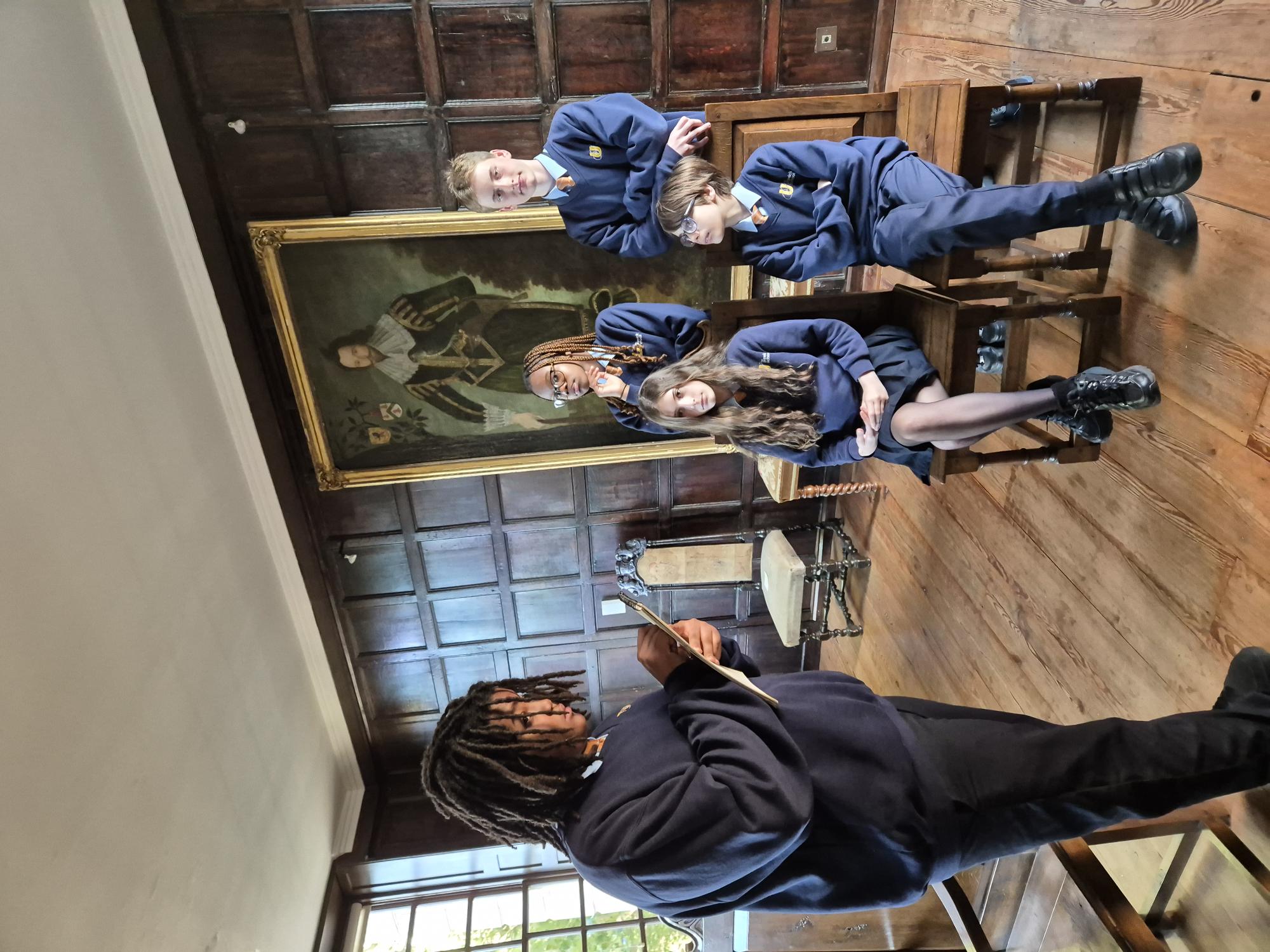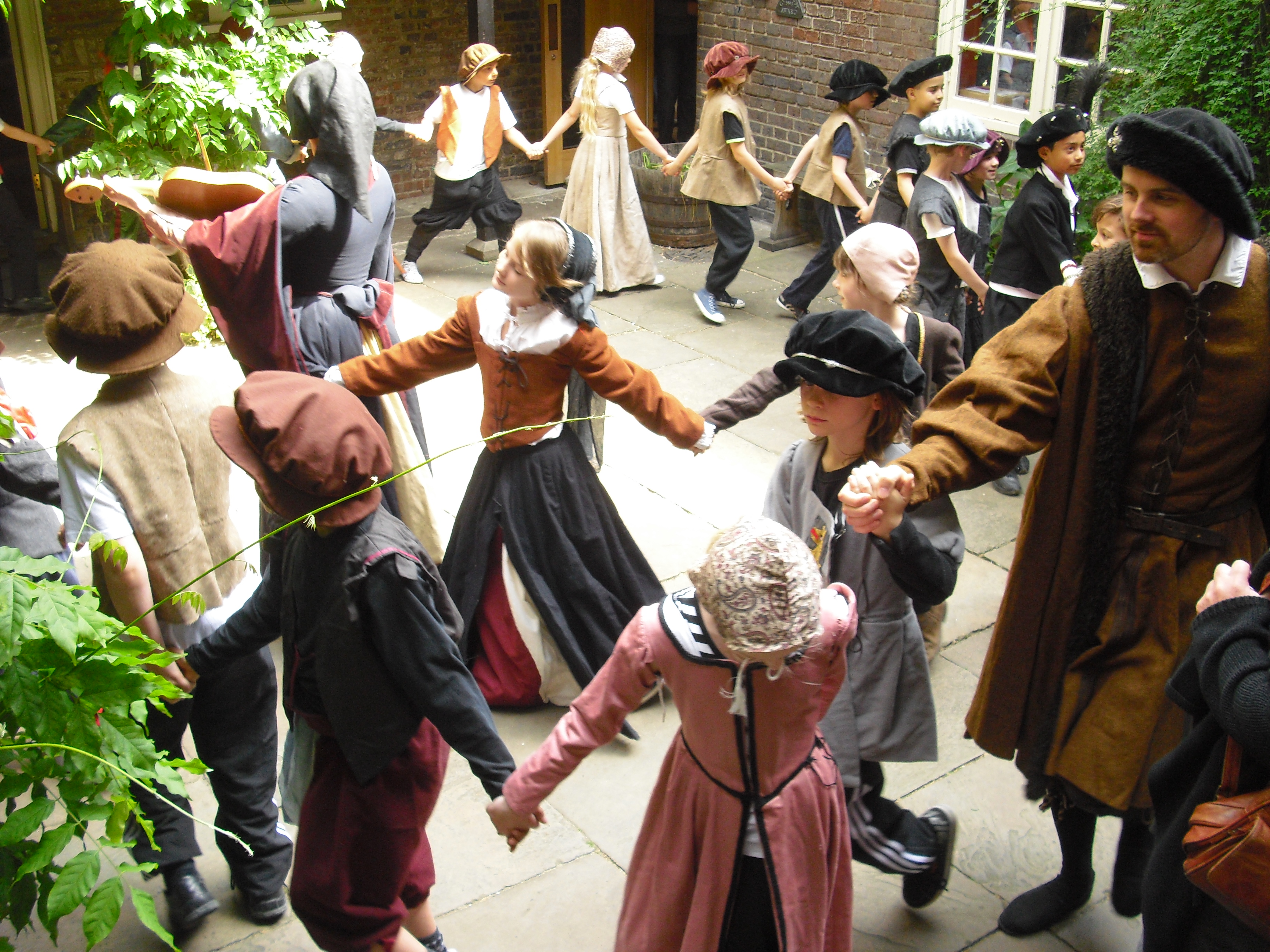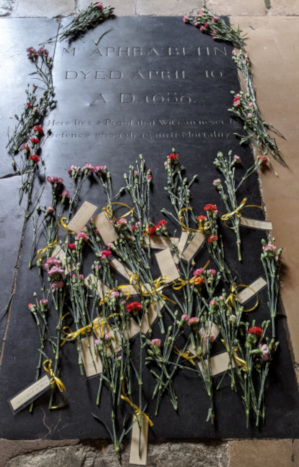News
When there were two Londons
Six hundred years after Londinium was rebuilt in stone, there are two cities living uneasily a half hour walk apart. One is falling into disrepair, the other serves the needs of a population of new arrivals. Each is a good place to make a living, to hide or to pursue dreams. In the old town, the last of a Roman family has just died, leaving an empty house and many unanswered questions. In Lundenwic a woman who has done the bidding of others for too long is preparing to take one final chance to go on the road; by the river a traveller has returned home devastating news; in an abandoned house a young nun is determined to take a crucial next step for her church and herself; and a Saxon trader needs to return to his own home with a story of success.
Groups of young Londoners from neighbouring boroughs are invited to join us at All Hallows by the Tower in March to take the story further. Click here for further details and to book.
Sutton House Reclaimed

It is a delight to be working at Sutton House once more. 2025 has seen the start of a new project and the first school visits since the pandemic and its aftermath put a stop to so much. Now young people are visiting for the first time, old friends are returning, and new initiatives are taking root.
Sutton House is a precious survivor. Dating from 1535 and retaining much of its original structure, it has witnessed five centuries of Hackney history. Yet in the 1980s it was derelict, damp and vandalised, its past largely forgotten. The low point came when Sutton House narrowly escaped being turned into luxury flats and lost to public access. A local campaign persuaded the National Trust, its owners since the 1930s, to restore and open Sutton House to the public. For some years a lively and innovative community scheme ensured that not only Londoners of all ages but many others came to see the building and hear some of its rediscovered history.
Clio’s Company have been involved in the fortunes of Sutton House since the days of the campaign – our work there has included not only the Hackney Tudors drama workshops for schools but music, festivals, concerts and events. As part of the new project we are recording interviews with some of the people involved in the Save Sutton House campaign as well as undertaking new research and working with local young people to create and present their own piece of interactive drama.

The children at the end of the garden
It was in the 1890s that much of the garden of Sutton House became a school. And this year, more than a century later, the children of St John and St James Primary School have helped us to reimagine a Tudor Christmas. We worked together to create greenery bunches to decorate the Great Chamber, using evergreens, ribbons, apples, oranges and candles.

Shadows of the Romans
Shoddy workmanship, coins counterfeited to pay for – what?, a trophy wife at war with her half forgotten past, an army officer made vulnerable by nostalgia for his grandfather’s Britannia – all among the tricksters, building sites and military patrols of a town the Romans are rebuilding in stone. This is a world where the head of the civil service is a slave and newcomers from all over the Roman Empire have arrived to try to make a fortune. But not everyone wants to be a Roman citizen. Clio’s Company leave you with a cliffhanger. Bring your group to help decide what happened next at All Hallows by the Tower in November.
Book hereRomans come to the forest

We have been working with two Waltham Forest schools to create our own version of how and why the first specifically Roman community may have come to Walthamstow. Participants used the evidence and their imaginations to decide why their characters might have made Londinium too hot to hold them. Here, a talented builder and architect is planning to work his way home to Greece – but the way is fraught with danger. We created dramatised versions of the stories of each character, telling the stories with the help of the kind of masks used by actors two thousand years ago
More Light on Aphra

Over the past months we have been working with London students to make discoveries and cast further light on Aphra Behn, the first woman to earn her living by writing. Groups from primary to university level have been discovering aspects of her work and going on to create their own responses, including music, dance and versions of her drama and poetry.
Last year, during lockdown, we were able to stage a small scale commemoration beside Aphra Behn’s grave in Westminster Abbey. This year celebrated how much she and her work resonate with today’s young people.
In June we presented an installation of live and filmed work at Barnard’s Inn Hall: Behn, The Moon and the Printing Press
The project is supported by the Portal Trust (previously known as Sir John Cass’s Foundation)
The Story Continues: Saxons join the Romans online
Two of our schools programmes in partnership with All Hallows by the Tower are now available online. The first, “Ultima Britannia”, set in the early days of Roman London when the new stone city was still unfinished in the aftermath of Boudicca’s rebellion, begins the story of the house whose floor still exists under the church. Visit www.ultimabritannia.co.uk for more details.
Now “Lundenwic” takes us to the time when the semi-abandoned Roman Londinium and the new Saxon town three miles away live as uneasy neighbours with different languages, cultures and ways of life. At All Hallows, the same house still stands, grand but almost derelict, its future left in doubt after the death of its elderly owner. Go to www.lundenwic.org to find out more.
We have now created interactive online versions of both – participants are involved in the stories as they unfold, and invited to decide for themselves what might have happened next.
Thanks to funding from the Culture Recovery Fund for Heritage, the Worshipful Company of World Traders and the Derek Shuttleworth Educational Trust, we are able to offer these programmes free to London schools. Please email for further information or to reserve a place for your group.
Aphra Behn and After

The workshop phase is well underway. Groups of students from London secondary schools are working on different aspects of Aphra Behn’s work, from her early career as a spy to her life as the first professional woman playwright to the way she has been remembered in the centuries since her death in 1689. One important focus of the project will be Behn’s final play, “The Widow Ranter” which Behn appears to have been struggling to finish in the final months of her life, and which we will be staging for the first time since its one outing in the months following its author’s death. Set in colonial Virginia and loosely based on an uprising in 1670, the play features satire, spectacle, at least four love stories and an out spoken, cross dressing, gin swilling heroine who, like many a Londoner of her time, left to seek her fortune in the new world as an indentured servant. After a semi staged reading of the play we are currently working on aspects of the play with school groups; there will be a full scale production in 2021 as well as a website, www.aphrabehn.london to record and share our discoveries.
Famously Virginia Woolf was among those who helped to bring Aphra Behn’s name out from the shadows in the early twentieth century. Woolf asserted that “all women together ought to let flowers fall on the tomb of Aphra Behn, for it was she who earned them the right to speak their minds”. Yet this praise for Behn as a trailblazer does not do justice to the quality of her writing. We will indeed be bringing some of our young participants to Westminster Abbey to honour Behn’s memory, not only with flowers for her grave but also with showcases of her work.
The era of the two Londons: Lundenwic at All Hallows by the Tower

Our March 2020 programme for primary schools at All Hallows by the Tower was “Lundenwic” – set in the period when a final few were trying to keep the Roman way of life going in the old Londinium while a new wooden, Saxon city was flourishing three miles away around what is now Trafalgar Square. The two cities did most things differently, from building to poetry, from language to religion. But sometimes a kind of co-operation was possible.
Walthamstow Notes

For the third phase of the Walthamstow Notes project we focused on the area in the 1960s and 70s – the era of post-war change and reconstruction. Famously, the Beatles, as well as the other big bands of the day, played the Granada, which was only the biggest and most famous of many music venues. Local primary schools, the Waltham Forest Music Service, Vestry House Museum and St Saviour’s Church all helped to create a series of events and exhibitions show casing our discoveries and responses to the music of the time. One highlight was a schools band event presided over by locally born Terry Rance, one of the original line-up of Iron Maiden. Another was the twist explosion led by nine year olds which was the finale of our day’s activities at Vestry House Museum.

After Aphra and The Widow Ranter

“After Aphra” is a new look at the story of Aphra Behn and her final play, “The Widow Ranter”. We wrote and staged it in two locations in 2018 – the Hen and Chickens Theatre in Islington and, thanks to the generosity of the Company of Watermen and LIghtermen, the wonderful surroundings of their 1700 Court Room.
The play is set as “The Widow Ranter” is staged for its first and only run in the aftermath of its author’s death, and looks at Behn’s own life story as well as incorporating sections of the play and its music, using an actor and a musician of the day as two of the three characters, while the third, a former indentured servant who has returned to London with the fortune he made in Virginia, is based on the stories of real people of the time.
We plan to revisit “After Aphra” next year as well as working towards a full production of “The Widow Ranter” to tie in with the 350th anniversary in 2021 of the staging of Aphra Behn’s first play.

Continuing City: Arts in Education at All Hallows by the Tower
All Hallows by the Tower has been part of the City of London landscape for thirteen hundred years, and people have lived and worked there for far longer. Clio’s Company and the community of All Hallows have been working together since 2001 on a series of arts in education projects, some also involving the Company of Watermen and Lightermen. In the current series, we use a combination of known historical and imagined but possible events to stage a series of site-specific plays and complementary workshops for primary school children to bring to life the rich and complex history of the church in its context.
In November 2018 London primary school children took part in “Ultima Britannia”, a project focusing on London 2,000 years ago when it was a raw, new, dangerous town on the edge of the known world and All Hallows was a building site where a Roman villa was being constructed.
News Archive
For further information on any of these projects and events, please contact us by email.
